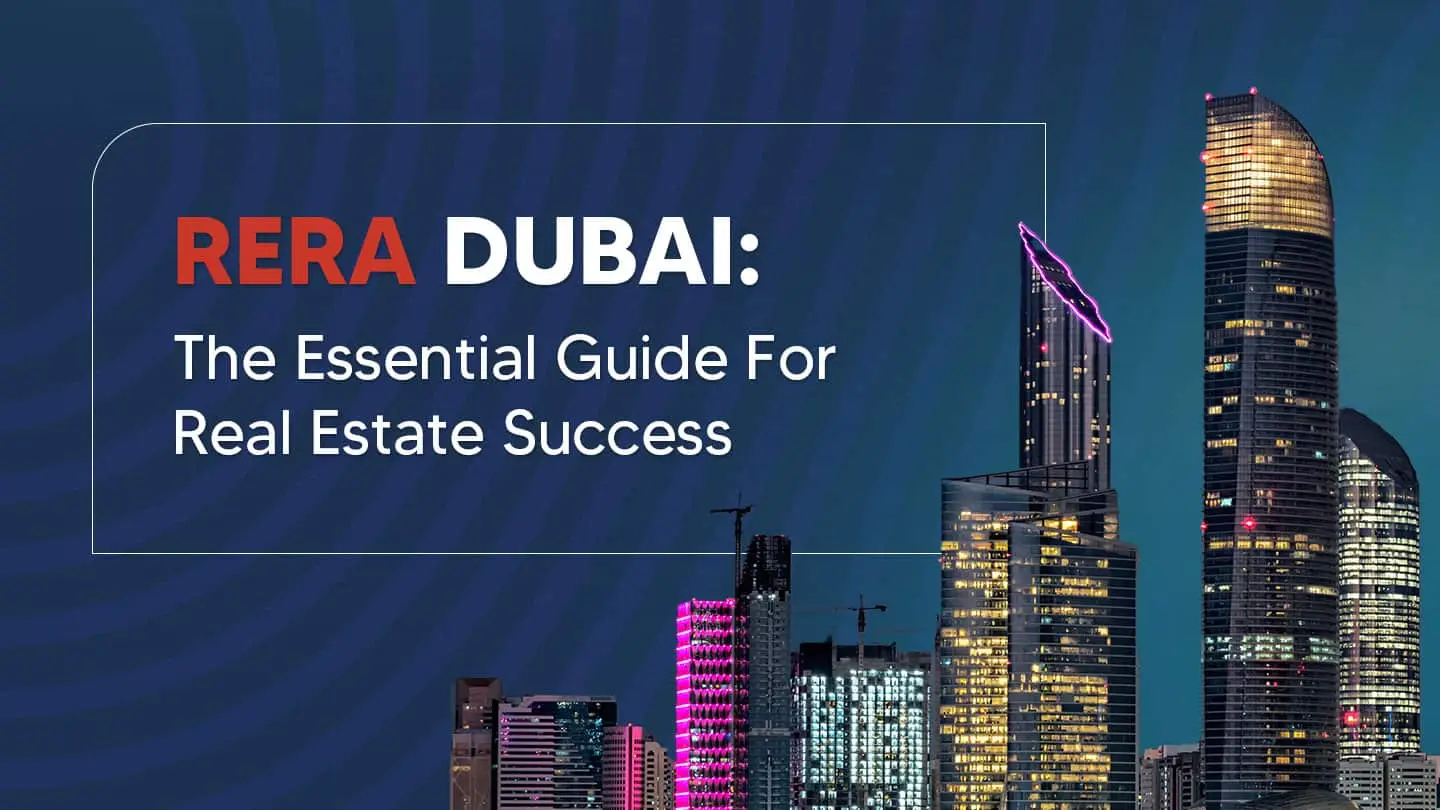Dubai’s real estate market is among the fastest-growing and most dynamic in the world. As a result, the government has established regulatory bodies to ensure smooth operations and protect the interests of all parties involved in the real estate industry. One of the most important entities in this sector is the Real Estate Regulatory Agency (RERA Dubai). RERA plays a crucial role in overseeing and regulating the real estate market in Dubai, ensuring transparency, fairness, and compliance with laws.
In this blog, we will explore everything you need to know about RERA Dubai, including its responsibilities, RERA forms, the registration process, tenancy laws, and much more.
What is RERA Dubai?
The Real Estate Regulatory Agency (RERA) is part of the Dubai Land Department (DLD) and is responsible for overseeing and regulating all real estate activities in Dubai. It aims to promote a transparent and sustainable real estate market by ensuring compliance with laws, regulations, and best practices. RERA’s mandate covers various areas such as property registration, tenancy agreements, real estate brokerage, property valuation, and more.
As part of Dubai’s ambitious development goals, RERA’s role has become vital in maintaining investor confidence and protecting tenants’ and landlords’ rights. Through effective governance and strict compliance, RERA helps build a secure, efficient, and trusted real estate market in Dubai.
Benefits of RERA Dubai
RERA (Real Estate Regulatory Agency) Dubai offers several benefits for real estate professionals, investors, and consumers, ensuring a transparent and efficient market. Here are the key advantages:
Regulation and Compliance
RERA Dubai enforces laws and regulations that ensure real estate transactions are fair, transparent, and legally compliant, offering protection to investors and property buyers.
Consumer Protection
RERA Dubai provides a mechanism for resolving disputes, ensuring that the rights of property buyers, tenants, and sellers are safeguarded.
Increased Market Transparency
By maintaining a database of properties and transactions, RERA Dubai ensures transparency in the real estate market, helping buyers and investors make informed decisions.
Property Registration and Legal Documentation
RERA Dubai ensures that all real estate transactions are correctly registered, provides legal documentation for ownership, and protects the parties’ interests.
Professionalism in the Market
Through its licensing requirements for real estate agents and brokers, RERA Dubai enhances the industry’s professionalism, ensuring that agents adhere to high standards of service and ethics.
Enhances Investment Confidence
With a regulated real estate market and transparent legal frameworks, RERA Dubai instils confidence among local and international investors, contributing to the property sector’s growth.
Development of Market Standards
RERA Dubai continuously sets industry standards, helping to improve the quality and competitiveness of real estate services across the UAE.
Real estate professionals and investors can be assured of a stable, protected, and well-regulated market environment by adhering to RERA regulations.
What are the Responsibilities of RERA Dubai?
RERA Dubai has a wide range of responsibilities, including but not limited to:
- Regulating Real Estate Professionals: RERA supervises real estate brokers, agents, developers, and other professionals in the industry to ensure they adhere to the established regulations and maintain ethical standards.
- Tenancy and Leasing Regulations: RERA oversees the creation of fair tenancy contracts between landlords and tenants and enforces regulations related to rent disputes and increases.
- Developing Real Estate Policies: RERA works with the Dubai Land Department to establish policies that ensure the real estate market is well-regulated and in line with Dubai’s broader economic objectives.
- Licensing and Registration: RERA provides the necessary registration processes for real estate agents, developers, and other professionals. This includes ensuring the availability of all documentation and compliance with the legal framework.
- Property Development and Projects: RERA ensures that new developments and real estate projects comply with the government’s regulatory and safety standards.
Dubai Land Department, RERA Forms, and Their Purpose
The Dubai Land Department (DLD) is the overarching body that encompasses various subdivisions, including RERA. RERA forms are essential documents used to manage and regulate transactions within the real estate sector.
These forms include applications for property registration, tenancy contracts, dispute resolutions, and more. They are essential for ensuring transparency, compliance, and proper record-keeping.
RERA Forms Include:
- Tenancy Contract Forms: For formalising rental agreements between landlords and tenants.
- Broker Registration Forms: These are used by real estate brokers to register with RERA and become licensed professionals.
- Property Ownership Forms: Necessary for registering property transfers, ownership changes, and other property-related transactions.
What are the Core Responsibilities of RERA?
RERA’s core responsibilities involve overseeing real estate transactions, handling rent disputes, ensuring property quality, and licensing real estate professionals.
Regulating Property Transactions
RERA supervises all real estate transactions in Dubai, ensuring compliance with the regulations set by the Dubai Land Department. This includes maintaining an organised property ownership database, preventing fraud, and ensuring property sales and leasing transparency.
Handling Rent Disputes and Laws
RERA also resolves disputes between landlords and tenants, particularly regarding rent increases and contract issues. It enforces the Dubai Tenancy Law, ensuring fair treatment for both parties involved in a lease agreement.
Issuing Licenses
Real estate professionals, such as brokers and agents, must be licensed by RERA before operating in the market. This ensures that only qualified professionals are involved in property transactions.
Read more: How to Secure Your RERA License in Dubai
Ensuring Property Quality and Safety
RERA works with other government bodies to ensure that properties meet safety and construction standards. It plays a role in issuing certifications for new developments and ensuring that these projects are safe for occupants.
RERA Forms
As mentioned, RERA forms are crucial in regulating the Dubai real estate market. These forms are vital tools for ensuring transparency and facilitating various processes in the real estate industry.
Some common forms include:
- Tenancy Agreement Forms: These are used to establish the terms and conditions of rental contracts.
- Broker Registration Forms: These allow real estate agents to be legally recognised as operating within Dubai.
- Rent Increase Forms: These are used when a landlord wishes to raise the rent and must comply with the legal limitations set by RERA.
What is the procedure for RERA registration?
The RERA (Real Estate Regulatory Agency) registration process in Dubai is crucial for businesses in the real estate sector, ensuring compliance with regulations set by the Dubai Land Department. Here’s a breakdown of the steps for RERA Dubai registration:
Step 1: Eligibility Criteria
Ensure your business is related to real estate activities such as brokerage, property management, sales, or leasing. The company must be registered with the Dubai Department of Economic Development (DED) to operate legally.
Step 2: Submit Application
Apply through the RERA portal or visit the Dubai Land Department to initiate the process. Provide required documentation such as your business license, proof of ownership or lease of office space, and relevant staff certifications.
Step 3: Staff Certification
Ensure that the agents involved in real estate activities are certified by RERA. This typically requires completing the Real Estate Regulatory Agency (RERA) training and passing an exam. The training courses are available through RERA-approved institutes.
Step 4: Pay Fees
The registration involves application fees. The exact amount may vary depending on your business type.
Step 5: Await Approval
Once your application and documents are submitted, RERA will review the information. This process can take some time. Upon approval, your company will receive the RERA registration certificate.
Step 6: Post-Registration Requirements
Once registered, your business must comply with ongoing regulations and standards set by RERA. Ensure all real estate agents maintain their RERA certification through continuous professional development courses.
By completing the RERA Dubai registration process, real estate businesses can legally operate within Dubai, adhering to regulatory standards while enhancing their credibility.
RERA Compliance and Rules
RERA has established rules and regulations that all real estate transactions must follow. Non-compliance with these rules can result in penalties, fines, or even the revocation of licenses for brokers and developers. Key rules include:
- Rent Control: The Dubai Rent Law governs how rent increases are handled. Rent hikes are limited to a specific percentage, depending on the current rent.
- Tenancy Contracts: RERA ensures that tenancy contracts are legally binding and contain all necessary clauses to protect landlords and tenants.
Key Takeaways from Dubai Tenancy Law
Understanding Dubai’s tenancy laws is essential for landlords and tenants to ensure fair practices and avoid potential conflicts.
- Tenancy Contracts: Landlords and tenants must sign a written tenancy contract, which must be registered with RERA.
- Rent Increase: Rent increases are regulated and can only happen within a defined percentage once a year.
- Rent Disputes: Any disputes regarding rent, eviction, or contract violations can be resolved through RERA or the Rent Dispute Center.
Terms of the RERA Tenancy Contract in Dubai
The tenancy contract in Dubai must contain essential details such as:
- Duration of the lease.
- Rent amount and payment schedule.
- Maintenance responsibilities.
- Conditions for eviction and renewal.
Rent Increase in Dubai
According to RERA regulations, landlords can only increase rent under certain conditions. The increase must comply with the guidelines outlined in the Dubai Tenancy Law.
For instance, rent cannot be increased beyond a set percentage without proper justification, and landlords must provide adequate notice before increasing rent.
Responsibilities of Tenants and Landlords
Tenants and landlords have clearly defined responsibilities under RERA regulations, ensuring smooth and respectful tenancy relationships.
- Tenants: Tenants are responsible for paying rent on time, maintaining the property, and adhering to the lease agreement terms.
- Landlords: Landlords must ensure the property is habitable, perform necessary maintenance, and respond promptly to tenants’ concerns.
RERA Dubai: Ensuring Fairness in Real Estate
RERA Dubai plays a crucial role in ensuring fairness, transparency, and regulation within the real estate market. Whether you’re a tenant, landlord, or real estate professional, understanding RERA’s role and rules is crucial for maintaining a smooth and legal real estate experience in Dubai.
If you’re looking to navigate the complexities of real estate transactions in Dubai, Shuraa Business Setup is here to help. We provide expert guidance and support at every step of the process.
For more information or assistance, contact us at +97144081900, send a WhatsApp message to +971507775554, or email us at [email protected].
Common Questions about Dubai RERA
Q1. What is the purpose of RERA Dubai?
RERA regulates the real estate market in Dubai, ensuring compliance with laws, overseeing tenancy contracts, and protecting the rights of tenants and landlords.
Q2. Is RERA applicable in Dubai?
Yes, the Real Estate Regulatory Agency (RERA) is applicable in Dubai. It is a government department within the Dubai Land Department (DLD) tasked with regulating the real estate market. RERA provides openness, accountability, and security to all stakeholders, including developers, investors, purchasers, and renters. RERA fosters a fair and competitive environment by creating clear norms and monitoring compliance, making Dubai an internationally desirable real estate investment destination.
Q3. What is RERA certification in Dubai?
RERA certification in Dubai is a mandatory qualification for real estate professionals, issued by the Real Estate Regulatory Authority (RERA). It ensures agents understand Dubai’s real estate laws, ethical practices, and market regulations. To get certified, individuals must complete a training course and pass an exam. This certification is essential for legally working as a real estate agent in Dubai.
Q4. How do I register as a real estate broker with RERA?
To register, real estate brokers must submit the necessary forms and documentation to RERA. Once approved, you will receive a license to operate.
Q5. Can rent be increased in Dubai?
Yes, but only within the limits set by RERA. The Dubai Rent Law regulates rent increases.
Q6. What happens if a tenant violates the tenancy agreement?
RERA provides mechanisms for resolving disputes between landlords and tenants, including rent-related issues and breaches of contract.
Q7. What is the role of Shuraa Business Setup in RERA-related processes?
Shuraa Business Setup helps individuals and companies navigate the RERA registration, compliance, and documentation processes, ensuring a smooth legal real estate experience.
*Please note that the information provided in this post is for general informational purposes only and may be subject to changes due to updates in government policies and regulations.







